Iranian Murders 12 As Revenge For Honor Killing Of Sister

A man who witnessed his sister murdered in an honor killing by their father and brothers as a child has murdered multiple members of his family in a revenge killing.

A man who witnessed his sister murdered in an honor killing by their father and brothers as a child has murdered multiple members of his family in a revenge killing.
The killer, identified only as Bahram, was just 12 years old when he witnessed the brutal murder of his sister in the hands of their father and brothers, leaving him with serious mental trauma.
On Saturday, following a verbal altercation, Bahram, 22, a teacher, stormed his family's home armed with a Kalashnikov rifle, killing 12 people before being killed by police.
Among the dead were the parents, three brothers, two sisters, one sister-in-law, and four nephews. Additionally, three neighbors sustained injuries during the altercation but survived.
The incident sheds light on a broader issue of honor killings in Iran. Recent reports from human rights organizations have highlighted the trend, with 13 women falling victim to such violence across various cities between September 29 and October 16.
The exact number of such murders remains undisclosed, obscured by secrecy and a lack of transparency within the regime. Previous estimates suggest an annual range of 375 to 450 such killings, indicating a likely higher toll due to underreporting data.
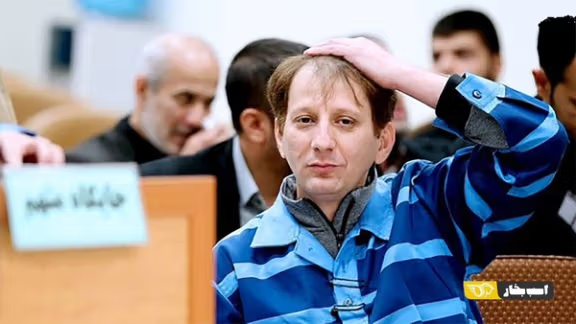
Babak Zanjani, an Iranian oil sales middleman sentenced to death for embezzling the proceeds, may be released, as the judiciary has confirmed that his overseas assets were transferred to the country to settle his debts.
Zanjani, a regime insider once hailed as Iran's wealthiest man, was tasked with exporting oil circumventing international sanctions in the early 2010s when Mahmoud Ahmadinejad was president. He failed to pay back about $3 billion. Zanjani was arrested and convicted in 2013 after Hassan Rouhani was elected president. His accomplices in the government were never identified. It would not have been possible for him to embezzle such a large amount of money without insider support.
Earlier in the week, his lawyer, Rasoul Kouhpayehzadeh, pleaded for his release in light of recent disclosures by the Judiciary, which stated that Zanjani’s assets abroad have been located and transferred to Tehran to offset his debts and liabilities.
Chief Justice Gholam-Hossein Mohseni-Ejei claimed that, according to preliminary assessments, the collected assets are worth more than what he owes. Zanjani's assets in Iran had been confiscated by court order after his arrest but they were reportedly only a fraction of the assets abroad that he initially refused to repatriate. Iranian authorities have not released any details or figures about his assets.
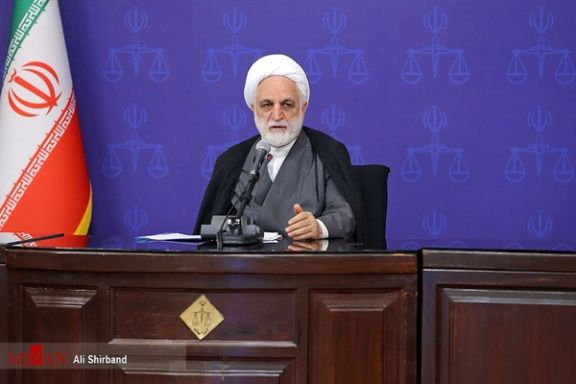
However, Khabar Online website, which is close to moderate conservatives, reported Tuesday that the total value of Babak Zanjani's assets abroad is estimated to be around $4 to $5 billion. According to the report, approximately $2 billion has been deposited into the central bank's account following the sale of his foreign assets. Zanjani's total debt was about $2.8 billion. A portion of this amount, approximately $1.3 billion, was repaid after the seizure of Zanjani's assets within the country, which included Sorinet Holding Company and Qeshm Airlines. The remaining $1.5 billion was updated to $2 billion, taking into account the accumulated interest over several years.
Zanjani sold Iranian oil on behalf of the National Iranian Oil Company (NIOC) during Ahmadinejad's second term (2009-13) through an elaborate network of black-market dealers and money-launderers − particularly in the UAE, Turkey and Malaysia. According to his statements, he had managed to transfer $17 billion of the proceeds from oil sales to the country by 2013.
The shifting political landscape in Iran transformed Zanjani, once synonymous with immense wealth and influence, into a figure facing legal scrutiny and international sanctions, thrusting him into a high-profile legal battle with widespread ramifications. His name is linked to various high-profile economic scandals and legal investigations.
In addition to failing to repatriate oil sales proceeds, he is also accused of securing foreign currency from Iran’s Central Bank for imports, selling it in the black market. In another case he was accused of misappropriating funds from Iran's Social Security Organization in collaboration with Saeed Mortazavi, the former head of the organization who was also Iran’s former deputy prosecutor general.
At the time of his arrest and trial, Iranian media highlighted his ties to the Revolutionary Guards (IRGC), while some outlets portrayed him as a scapegoat. Subsequently, he was sanctioned by the Council of the European Union in December 2012 and by the United States Treasury in April 2013.
Zanjani, now over 50 years old, built a business empire in a short time, claiming his net worth was $13.5 billion. Zanjani had reportedly stashed billions of dollars from oil sales in foreign bank accounts or invested the money abroad in a range of enterprises including hospitality, commercial aviation, infrastructure, and real estate. He once said in an interview that he owned 64 companies.
The Islamic Republic has numerous mechanisms in place through a wide range of entities and organizations to sell its oil via third parties to evade sanctions. The country has also started giving oil to state organizations, including the IRGC, to boost their budgets without allocating any money to them. Such operations are usually carried out by a network of state bodies and businesspeople with close ties to the regime, who usually gain huge profits in the process. However, with every new administration in office, former assets become a liability and bear the brunt of the political games of the regime.
Documents leaked by a cyberattack on the Iranian parliament’s media arm last week revealed the parliament's coordination with designated Iranian entities and individuals to facilitate their trade activities and conceal their identities and connections from international regulatory bodies as the ever evolving web of sanctions evasions continues.
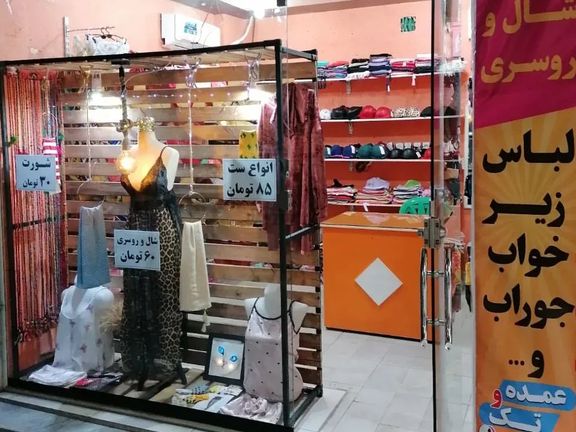
A women's underwear store in Iran’s religious city of Mashhad was sealed by authorities due to its having a male shopkeeper, in further economic and social crackdowns by authorities.
Mohsen Seyyedi, the Manager of Inspection and Supervision of Guilds in Khorasan Razavi Province, made the announcement regarding the closure of the shop situated on 17th of Shahrivar Street in Mashhad.
Seyyedi emphasized that the store, which primarily sold women's clothing, “engaged in unconventional behavior through its online advertising.” He stated that the sale of women's underwear should be exclusively conducted by female sellers.
Iranian regulations and restrictions concerning women's underwear stores are deeply influenced by cultural, religious, and legal considerations. The regulations mandate that such establishments must be operated by female shopkeepers, aligning with Islamic norms regarding “modesty and privacy”. Additionally, the advertising and display of women's underwear is generally forbidden.
Iranian authorities have in the past issued warnings to shop owners regarding the display of female mannequins wearing underwear or curve-revealing clothes.
The crackdown is part of a broader campaign against women's clothing and hijab, intensified following protests following the death in custody of Mahsa Amini in 2022.
Since the Islamic Revolution in 1979, Iran's government has imposed restrictions on dress, requiring women to cover their hair and encouraging the wearing of traditional head-to-toe garments.
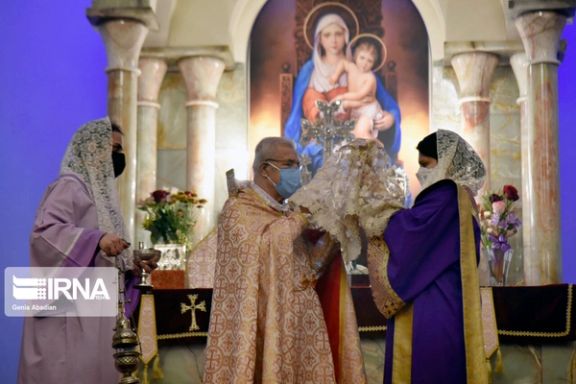
The 2023 annual report by the London-based organization, Article18, has revealed an increasing number of Christians arrested in Iran last year, up from 134 to 166 since 2022.
The report, titled 'Faceless Victims: Rights Violations Against Christians in Iran', co-released with Open Doors, CSW, and Middle East Concern, highlights the plight of numerous victims whose identities remain undisclosed due to fears of exacerbating their situation.
The arrests occurred in waves throughout the year. "Just a handful reported prior to June, then over 100 within the next three months, before a further rash of arrests at Christmas," the report states, underscoring the sudden spikes in persecution faced by the Christian community.
"At least 17 of the Christians arrested during the summer had received prison sentences of between three months and five years, or non-custodial punishments such as fines, flogging, and in one case the community-service of digging graves," researchers stated.
Only two individuals, Elisa Shahverdian and her husband, Hakop Gochumyan, were identified among those arrested during the summer, with Gochumyan still detained in Evin Prison.
Even when released from prison, the harassment continues, the report states, with seven different types of post-prison pressure listed, including continued monitoring, denial of employment and education, new charges or reopened cases. All of which, “make it increasingly difficult for Christians to remain in Iran”.
Like many escaping the regime, the report notes that “many [Christians] flee ... only to find a new set of challenges awaiting them as refugees".
Bible distributors are among the most harassed targets, with "over one-third of arrests targeting individuals in possession of multiple copies."
The Abrahamic faiths, Christianity, Islam and Judaism, are the only legal religions in Shia majority Iran, but Sunni minority Muslims, Jews and Christians continue to face persecution. Other minorities such as the 300,000 strong Bahai community, face systematic persecution.
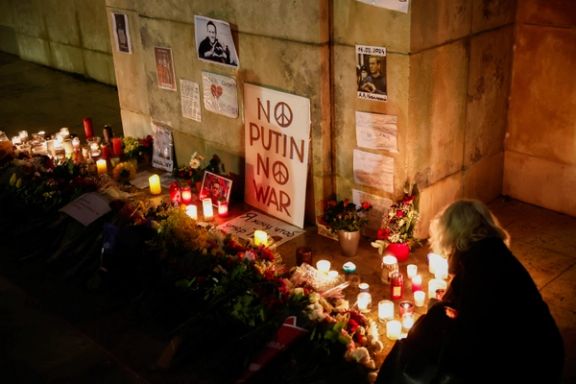
In the annals of Russian history, few figures stand as tall as Alexei Navalny. His name has become synonymous with courage, resilience, and unwavering commitment to justice in the face of oppression.
From surviving a poisoning attempt orchestrated by the Kremlin, to boldly returning to Russia despite the risks, Navalny's journey embodies the spirit of defiance against tyranny.
Navalny's activism began long before his poisoning in August 2020. As a prominent anti-corruption crusader and political opposition leader, he had long been a thorn in the side of Vladimir Putin's regime. His relentless investigations into corruption at the highest levels of government exposed the rot at the core of Putin's rule, earning him both admiration and ire from supporters and adversaries alike.
But it was the brazen attempt on Navalny's life that catapulted him onto the international stage and transformed him into a symbol of resistance against Putin's authoritarian regime. Despite suffering near-fatal poisoning with Novichok, a deadly nerve agent, Navalny defied the odds and survived. His recovery, against all odds, was a testament to his resilience and determination to continue the fight for justice.
Navalny's return to Russia in January 2021, just months after his poisoning, further underscored his unwavering commitment to his cause. Despite the genuine threat to his life, he chose to confront his would-be assassins head-on, declaring, "I'm not afraid." His defiance in the face of danger inspired millions of Russians who yearned for change and galvanized a new wave of opposition to Putin's regime.

Navalny’s life and death has undoubtedly left a deep impression on activists facing tyrannical regimes around the world, including in Iran, where hundreds of dissidents suffer isolation and often torture in prisons. Many Iranians voiced outrage upon hearing the news of his passing in a Gulag prison, flooding social media with messages of support.
In his powerful courtroom speech during his trial, Navalny minced no words in condemning Putin and his cronies for their corruption and oppression. He spoke not just for himself but for the millions of Russians who have suffered under Putin's rule. His words were a rallying cry for those who refuse to be silenced by fear, a call to action for all who believe in democracy and human rights.
Navalny's court defense succinctly highlights his defiance against Putin's regime and his unwavering commitment to justice. He accuses Putin of orchestrating his assassination attempt, asserting that his persecution stems from Putin's fear and hatred towards him for surviving the attempt. Condemning Putin as a cowardly "little man in a bunker," Navalny accuses him of resorting to murder to maintain power and brands him as "Vladimir the Underpants Poisoner." He challenges the trial's intimidation tactics, asserting that locking up one man cannot instill fear in millions. Navalny pledges to continue fighting despite facing imprisonment and urges others to do the same, demanding proper justice and fundamental rights such as participation in elections and equitable distribution of national wealth.

Navalny's activism, however, did not go unchallenged. Putin's regime, notorious for its brutal crackdowns on dissent, spared no effort in trying to silence Navalny and his supporters. From arbitrary arrests and politically motivated prosecutions to the use of state-sponsored violence, the regime sought to crush any opposition to its rule.
But Navalny remained undeterred. His courage in the face of adversity inspired countless Russians to join the fight for freedom and justice. His message resonated with those who had long suffered under Putin's repressive regime, giving voice to their aspirations for a better future.
As we mourn Navalny's passing, we must also celebrate his life and legacy. His death in prison is a tragic reminder of the lengths to which Putin's regime will go to cling to power. But it is also a testament to Navalny's unwavering commitment to his principles and willingness to sacrifice everything for the cause of justice.
As we honor Navalny's memory, let us renew our commitment to the values for which he fought so tirelessly. Let us demand justice for Navalny and all those whom Putin's regime has silenced. And let us continue to pressure Putin and his chain of corruption until justice prevails and freedom triumphs.
Let us call for the free world to recognize the severity of the situation in Russia under Putin's rule, rejecting the notion that continued dialogue will lead to meaningful change and instead urging decisive action, including the non-recognition of the upcoming Russian election. International solidarity is needed in addressing the crisis in Russia. It is time for the free world to stand up to Putin's tyranny and demand justice for the people of Russia.
As Navalny famously stated in an Oscar-winning 2022 documentary about his life by Canadian director Daniel Roher, "If they decide to kill me, You're not allowed to give up. If they decide to kill me, it means that we are incredibly strong. We need to utilize this power not to give up, to remember we are a huge power that these bad dudes are oppressing."
As he asked, we can't lose hope and must continue the fight. Dictators never rest, and neither can we. Let us join together, wiping away our tears, and pick up where he left off, standing firmly for justice and freedom.

While Iran funds billions of dollars into its regional proxies, retirees have been given a minimal new year bonus which falls far short of covering even the most essential expenses amidst the country's economic disaster.
Maryam Shokrani, an economic reporter, vocalized the frustration felt by many, stating, "They have deposited 25 million rials (less than 50 dollars) as pensioners' Eid gift; the money is equivalent to four pizzas and side dishes. Aren't they ashamed?!"
In Iran, the anticipation of the Muslim holiday of Eid which follows the Holy Month of Ramadan which begins next month, or the Iranian New Year, beginning on March 21, is often accompanied by the hope of receiving a bonus from employers.
The amount allocated for Eid or New Year bonuses has dwindled to such an extent that it no longer holds the purchasing power it once did. For countless families, the bonuses have become mere tokens, scarcely enough to cover basic necessities, let alone indulge in the customary tradition of purchasing new clothes for the occasion.
The size of the bonuses reflects broader economic challenges facing the country, including inflation and currency devaluation, which have eroded the value of salaries and bonuses alike.
In a bid to appease a disillusioned public on the eve of upcoming elections, Iranian workers are set to receive a government approved average salary increase of 20 percent starting in March, amid an annual inflation rate of around 50 percent. The new minimum monthly wage has been set at 115 million Iranian rials or about $230.
It comes as a slap in the face for workers and retirees alike. Iran's proxies across the Middle East from Lebanon to Yemen and beyond, received billions of dollars every year in funding, training and weapons from the regime, to the detriment of the country's civilians who have been pushed into the depths of poverty. Gaza-based Hamas alone has been receiving around $100 million from Iran for at least a decade according to the US Treasury while Lebanon and Yemen receive much higher patronage.